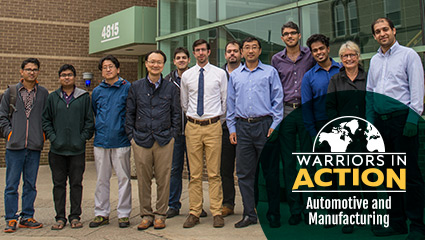Over the coming months, look for stories that feature some of the many Wayne State initiatives and pioneering individuals committed to automotive and manufacturing innovation. This content is part of WSU's Warriors in Action campaign highlighting how Wayne State is making a difference.
 Wayne State University received a $1.7 million grant from the Digital Manufacturing and Design Innovation Institute — an institute of the National Network of Manufacturing Innovation — for a project that will advance resistance spot welding (RSW) weldability qualification environments. The project, VRWP: Virtually Guided RSW Weldability Prediction, will allow original equipment manufacturers (OEMs) and suppliers to rapidly converge to feasible welded assembly designs during the early stages of new product development.
Wayne State University received a $1.7 million grant from the Digital Manufacturing and Design Innovation Institute — an institute of the National Network of Manufacturing Innovation — for a project that will advance resistance spot welding (RSW) weldability qualification environments. The project, VRWP: Virtually Guided RSW Weldability Prediction, will allow original equipment manufacturers (OEMs) and suppliers to rapidly converge to feasible welded assembly designs during the early stages of new product development.
According to Kyoung-Yun Kim, associate professor of industrial and systems engineering and site director of the National Science Foundation Center for e-Design at Wayne State, system integrators and OEMs working with products that have metallic structures currently rely on material suppliers and testing service companies to conduct physical testing of materials for new welded assembly designs. Without timely delivery of test results, the optimal selection of new materials, processes and related design decisions is hindered.
“When new materials or combinations of materials are considered for an assembly, industry often requires new physical tests or numerical simulations such as finite element analysis,” said Kim. “Data-driven weldability prediction will improve product design efficiency but is underutilized because of existing data inconsistences. Resistance spot welding processes and parameters are complex due to coating conditions and surface roughness, giving rise to significant data inconsistencies — a well-known reliability issue.”
The Wayne State team is partnering with Ford Motor Company to develop a reliable RSW weldability prediction tool. The end result will be a web-based tool that will improve design and engineering efficiency.
“This prediction tool will ultimately improve product quality through the utilization of advanced materials, allow users to rapidly assess weldment feasibility, and reduce the amount of physical testing required for new material candidates,” said Kim. “In addition, communication between OEMs and suppliers will be enhanced because of the standardization of RSW test data and material.”
The proof-of-concept system VRWP weldability qualification system will initially be applied for qualification of automotive body structure joining/welding at Ford Motor Company.
The co-principal investigators of this project from Wayne State University are Shiyong Lu​, associate professor of computer science; Jeremy L. Rickli, assistant professor of industrial and systems engineering​; Xin Wu, associate professor of mechanical engineering; and Qingyu Yang, associate professor of industrial and systems engineering​.
